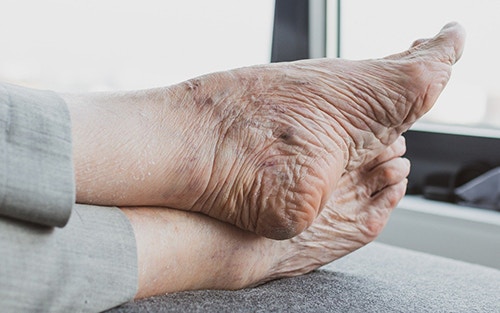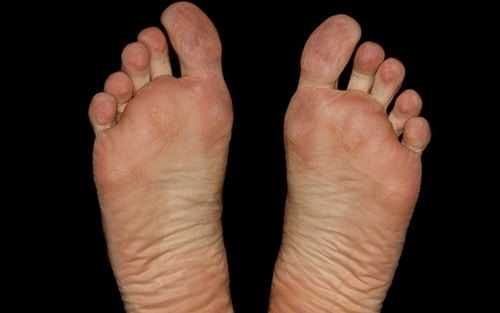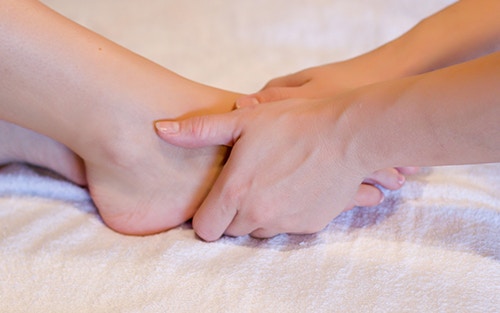Prevent your aging feet from robbing you of your mobility and health. Knowing how and why our feet change as we age helps us avoid painful problems as we get older.

yourfootpalace.com gathered the following information about how your feet change as you age, common foot problems you encounter as you age, and what you can do to prevent your feet from failing you.
How Aging Feet Change
Your feet progressively change in elasticity the same way other body parts do as they age. Tissue loosens, causing an increase in width and sagging or flattening arches. Consider the following commonly occurring foot problems:
Neuropathy – Symptoms of foot neuropathy include weakness, numbness, tingling, and sharp, jabbing, throbbing, or burning pain typically resulting from nerve damage.
Diabetes – With time, diabetes can cause severe nerve damage, commonly referred to as diabetic neuropathy. When you lose feeling in your feet, you can end up with cuts and sores on them from foreign objects (you cannot feel) in your socks or shoes. These cuts and sores can become infected.
Diabetes may lower the amount of blood flow to your feet. Without enough blood flowing to your legs and feet, sores and infections take considerably longer to heal. Often, bad infections never heal, resulting in gangrene and the potential loss of the foot or leg.
Sagging Arches – When arches sag, your weight is shifted toward the big toes, resulting in sore spots. Sagging arches can also alter the angle of each heel bone, leaving heel tendons (Achilles tendons) and muscles in your legs and back tight from a lack of natural stretching.
Arthritis – The most common form of arthritis is osteoarthritis, which is generally associated with aging. Other risk factors for osteoarthritis include joint injury, obesity, genetics, and anatomic factors such as joint shape and alignment. Frequent symptoms of foot and ankle arthritis include the following:
- Reduced Mobility
- Joint Stiffness
- Joint Swelling
- Tenderness and/or Pain
Note: While arthritis is commonly associated with aging individuals, it may also afflict younger adults.
Common Foot Problems
Aging takes an often severe toll on your feet (as it does with the rest of your body). Given the impossible amount of stress we place on our feet throughout a lifetime. From that perspective, it’s easier to understand why foot problems occur. Some of the more common foot problems seen in aging adults include:
- Bunions (a bony bump that forms on the joint at the base of your big toe.)
- Corns and Calluses (thick, hardened layers of skin)
- Hammertoes (an abnormal bend in the middle joint of a toe)
- Seborrheic Keratosis (a common noncancerous (benign) skin growth)
- Ingrown, thickened, or discolored nails
Regular visits with a podiatrist can help you prevent common problems while maintaining your foot health as you age.
Aging Feet – Care and Prevention

Don’t dismiss foot pain as being a fleeting or temporary condition. Many will live with persistent foot pain or refuse to seek medical attention until the pain and discomfort compel them to seek help. Any foot pain should never be considered normal. If you are experiencing such pain and discomfort, see a foot specialist sooner than later so it can be diagnosed and treated.
Remain vigilant over your physical health. Watch your feet for wounds, numbness, or excessive swelling. Any of these can be symptoms of severe conditions requiring immediate medical attention. Other ways to prevent problems with your feet include:
- Remain active by stretching in the morning to reduce joint stiffness.
- See your primary care physician or podiatrist if you experience any pain or swelling
- Lose weight to reduce foot stress
- Adjust your diet to prevent diabetes and other (food-related) disorders
- Monitor your blood pressure (120 systolic over 80 diastolic is ideal)
- Keep your feet clean and dry
- Have frequent pedicures to protect your feet’s hygiene
- Wear comfortable shoes, especially when walking long distances
- Have frequent foot massages
- If you smoke, stop

Note: Consider purchasing or having custom orthotics made. Orthotics or shoe inserts can provide support for falling arches and increase foot comfort.
Mature Feet
In this article, you discovered how your feet change as you get older, the more common problems found in aging feet, and how to keep your feet in excellent health.
Paying attention to minor changes in your feet will help you take appropriate action to prevent debilitating conditions and preserve your mobility as you get older.
Ignoring your foot health can lead to diminished mobility, painful conditions, and poor overall health and wellness.
Sources:
connect.uclahealth.org/2018/08/06/coping-with-the-changes-your-feet-undergo-as-you-age/
reidhealth.org/blog/how-to-care-for-aging-feet
health.clevelandclinic.org/shoes-getting-tight-feet-change-size-time/
mayoclinic.org/diseases-conditions/peripheral-neuropathy/symptoms-causes/syc-20352061
(706) 521-5290
(678) 963-5958